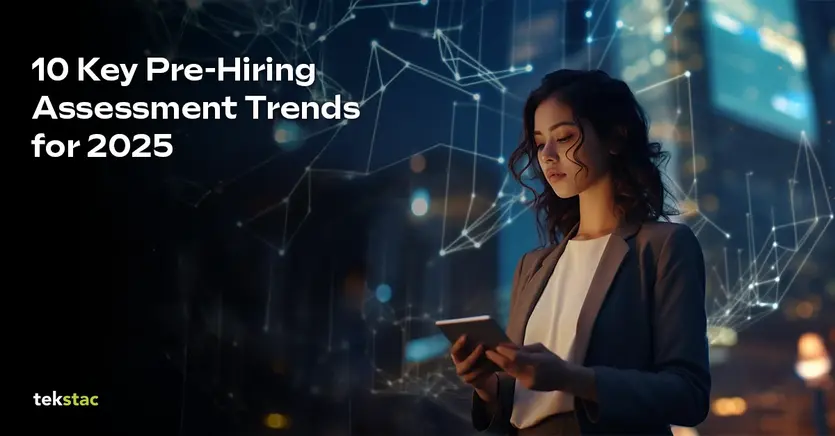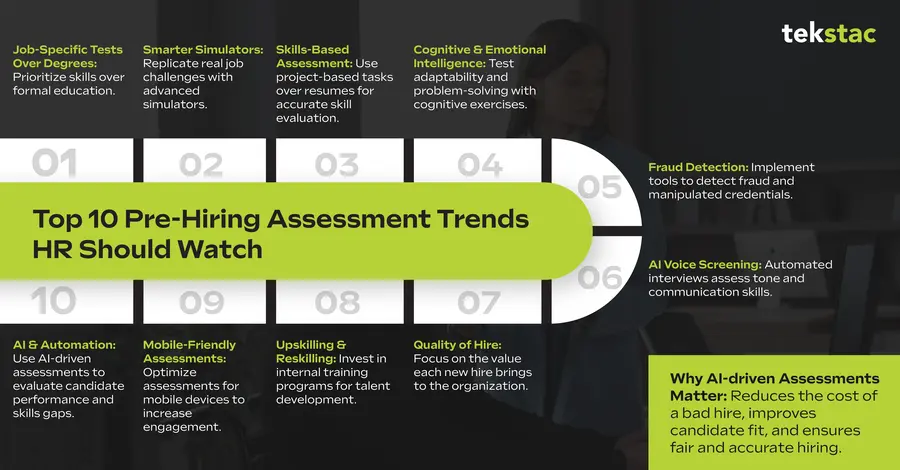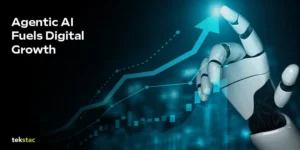10 Key Pre-Hiring Assessment Trends for 2025: How AI is Shaping Recruitment
November 27, 2024

In the rush to fill a position with the right candidate, many organizations overlook the importance of pre-hiring assessments, leading to costly hiring mistakes. Without proper evaluation methods in place, businesses risk selecting candidates who may not be the right fit for the role.
A bad hire isn’t just someone missing a skill or two; they can be expensive. According to CareerBuilder, a bad hire costs at least $18,700 for executive-level positions and more than $37,150 on average for Indian companies. Beyond financial loss, bad hires contribute to decreased productivity, low morale, and higher turnover rates, which impact overall business performance.
Why Are Companies Making Such Costly Hiring Mistakes?
A CareerBuilder survey revealed the top reasons for bad hires:
- 54% of companies found that the hires produced low-quality work
- 45% reported that the candidates’ skills didn’t match their claims
- 53% said the employee didn’t have a positive attitude
This data underscores the importance of accurate pre-hiring assessments. Organizations often rely on outdated hiring methods, focusing too much on resumes and interviews without truly assessing candidates’ skills. Fortunately, with advancements in technology and the growing adoption of AI, recruiting high-quality candidates has become more efficient and precise.
Understanding the role of AI in pre-hiring assessments
As of July 2024, 88% of companies globally use Artificial Intelligence (AI) for HR practices, according to LinkedIn’s Future of Recruitment Playbook.
AI can rapidly analyze vast amounts of candidate data—ranging from resumes to assessments—to identify hires that align with top-performing talent already within an organization. Beyond identification, AI enhances pre-hire assessments by designing tests that evaluate both technical and soft skills crucial for high performance.
Organizations using AI-driven pre-hire assessments are 46% more likely to find successful, skill-fit hires (CareerBuilder, 2024). These assessments are based on real-world job scenarios, ensuring candidates are not only skilled but also ready to perform from day one.
Additionally, AI-driven tools enhance assessment integrity by monitoring for suspicious activities and evaluating cultural fit, significantly reducing turnover.
Top 10 pre-hiring assessment trends for 2025
With AI and recent technologies in the market, pre-hiring assessments are evolving in how candidates are assessed.
Below are the top 10 pre-hiring assessment trends HR must watch out for:

1. The rising focus on job-specific tests over degrees
Companies are increasingly prioritizing skills over formal education. According to a recent McKinsey report, organizations are re-evaluating degree requirements and shifting toward skills-first hiring. This means talent acquisition teams will need to invest in job-specific tests that accurately measure the skills necessary for success in a role.
Hiring managers are now leveraging AI-powered competency frameworks that break down required skills for each position, ensuring a precise match between the job description and the candidate’s capabilities. This shift opens doors for non-traditional candidates, enabling companies to tap into a wider and more diverse talent pool.
2. The evolution of simulators in pre-hiring
Advanced simulators are becoming integral in assessing practical skills. They replicate real-world challenges to evaluate candidate performance. For instance, coding simulators test a developer’s debugging abilities, while customer service simulators assess how well candidates handle client inquiries.
Simulations provide a hands-on approach, allowing candidates to showcase their abilities in real-time. This trend is particularly prominent in IT, healthcare, and finance industries, where job performance depends heavily on applied knowledge.
3. Skills-based pre-hire assessment will dominate
Companies are moving beyond traditional resumes and interviews, favoring skills-based interviews, project-based assessments, and job-focused tasks. This shift reduces reliance on self-reported claims and ensures hiring decisions are based on proven competencies.
HR teams are adopting AI-driven skills assessment platforms that use adaptive testing to evaluate candidates dynamically, adjusting difficulty levels in real-time based on responses.
4. Cognitive testing for full talent evaluation
Employers recognize the importance of hiring candidates with strong cognitive and emotional intelligence. Assessments now include problem-solving tasks, role-playing scenarios, and situational judgment tests to minimize the risk of hiring cultural misfits.
AI-driven cognitive testing evaluates not only logical reasoning but also adaptability, creativity, and emotional intelligence—factors that contribute significantly to job performance and teamwork.
5. Fraud detection becomes mandatory
With the rise of AI-generated resumes and fraudulent applications, companies must implement assessment tools with built-in fraud detection. AI-driven hiring platforms can now verify credentials, detect inconsistencies, and prevent hiring mistakes based on manipulated data.
With features like plagiarism detection and remote proctoring, AI ensures that candidates take assessments honestly, making it easier to top talent based on merit.
6. AI voice pre-screening in early hiring stages
AI-powered voice screening is revolutionizing initial candidate assessments. These systems analyze communication skills, tone, and response patterns to generate insights for recruiters. However, organizations must ensure these technologies align with DEI (Diversity, Equity, and Inclusion) goals to prevent bias.
7. Measuring ‘quality of hire’ over quantity
With declining global hiring volumes, companies are shifting focus from the number of hires to the value each new hire brings. According to LinkedIn’s Future of Recruitment 2024 Playbook, measuring “quality of hire” through AI-driven analytics and post-hire performance tracking will be a key metric in talent acquisition.
Quality-of-hire metrics are calculated based on onboarding success, performance ratings, productivity levels, and retention rates within the first year of employment.
8. Upskilling and reskilling as a hiring strategy
Companies struggling to find skilled candidates externally increasingly turn to upskilling and reskilling programs for existing employees. Employees must participate in training programs followed by assessments to check their suitability. This approach to building a skilled workforce reduces excessive reliance on external hiring and at the same time, improves employee retention and reduces overall cost.
9. Mobile-friendly assessments to drive candidate engagement
With mobile devices now dominating internet usage, candidates expect to complete hiring assessments on their smartphones. Companies are optimizing pre-hire tests for mobile accessibility, enabling candidates to participate conveniently.
This shift increases application completion rates and allows companies to reach a wider talent pool, including gig workers and passive candidates.
10. AI and automation for smarter pre-hiring assessments
Along AI tools are enhancing resume screening, automated interview evaluations, and candidate performance analysis. They generate detailed reports highlighting skill gaps and strengths, providing HR teams with data-driven hiring insights.
Automated pre-hire assessments reduce human bias and accelerate the hiring process, allowing recruiters to focus on strategic decision-making rather than administrative tasks.
Why investing in AI-driven pre-hiring assessment tools is a smarter choice
Training and onboarding costs add an average of $1,252 per employee and 10+ hours of HR time.
Traditional hiring methods are proving insufficient in identifying the best candidates, making AI-driven pre-hiring assessments the most effective alternative in 2025.
For organizations hiring tech talent, specialized platforms such as Tekstac are transforming recruitment with competency-based assessments, real-time AI-driven proctoring, and automated candidate evaluation. These platforms offer integrity-focused hiring solutions, ensuring fairness, accuracy, and data-backed decision-making.
Final Thoughts
With hiring trends evolving rapidly, AI-driven assessments are becoming indispensable. Organizations investing in smart, data-backed hiring solutions will gain a competitive advantage, ensuring they onboard the right talent for long-term success.
To stay ahead, companies must explore AI-powered tools that align with their hiring goals—ushering in a new era of efficient, skills-based recruitment.





